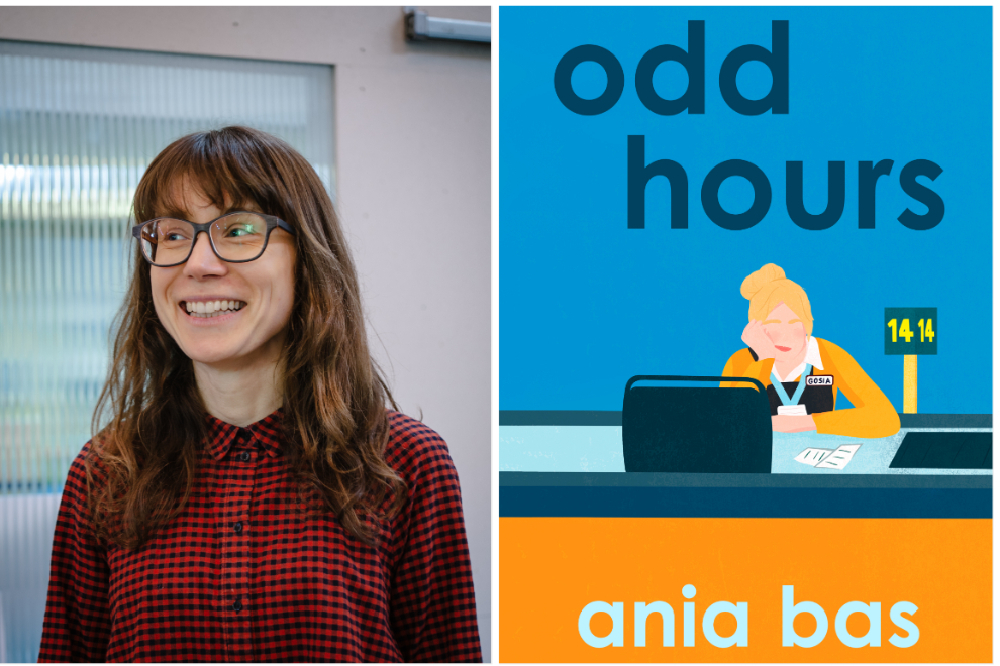When I moved to the UK, I spent the first few years living in the West Midlands where I found a job in a small library on the outskirts of Coventry as a customer assistant one day a week. Those four days a month paid my rent exactly and I cherished that job and the monthly reassurance that I would continue to have my room. I applied for the job in the first place because libraries to me have always been like an extensions of my living room. I thought it would be great to work in one. And it was!

Ania Bas, Odd Hours
I’ve used libraries extensively all my life and I am in awe of how such humble places mutate to accommodate my changing size, interests, behaviour and thinking. Wherever I have lived I’ve joined one, my wallet is brimming with library cards for multiple councils across the UK and reaching abroad.
When I first moved to the UK I was doing everything from library computers –buying my flight tickets back home, answering emails, updating my Facebook page, doing online research, it was a lot to squeeze into one free hour a day. I had my favourite computers and would wait for them to become available so I could sit by a radiator, or have my screen turned away from passers-by. As I got more embedded into life in the UK and as I became more financially secure some of these operations moved to my rented room and to my own laptop but I was still using libraries, this time to study, to read, to use reference books and to browse through their collections as some hold excellent archival materials.
Libraries allowed me to read extensively and for free, trying new genres, new authors, new areas of knowledge. I love browsing through books and taking a volume home because a book sounds wild, different, exciting. I came across Lucy Ellmann’s writing thanks to libraries. Varying Degrees of Hopelessness were available from my local library on Isle of Wight, and I just loved the title. I sought out her other titles after that and I remember a long wait till Mimi was released in 2013 as well as a more recent exhilarating experience when I saw the thickness of Ducks, Newburyport. Finally, a Lucy Ellmann that you can read for a month, not just an evening.
Together with artists Rosalie Schweiker and David Littler I organised Libraries Festival in a couple of towns in Bedfordshire. We brought diverse events to libraries such as chair-yoga, a talk on self-publishing with the bestselling self-published author Adam Croft and a comedy night with coffees, teas and cocktails. For me, it was an important experiment in what library spaces could hold, how they could lure people in but also a time of realisation and an important reminder of what libraries mean to people who seek refuge, access, community or quiet contemplation that doesn’t feel like a café, a theatre, a school.
When I was working on Odd Hours it was obvious that I had to make the library a place of refuge for Gosia. It’s a place that offers her access to knowledge, resources, people and Wi-Fi. As it did for me, it becomes Gosia’s cove, her haven but most importantly it is a place that allows her to be creative, a place where she writes poetry, even if her local library is not particularly glamorous. Social media plays a part in fooling us into believing that you can only be creative in pretty places, in a highly aesthetic environment. I strongly disagree. To me, libraries are perfect hotbeds for anyone who works with words – you are quite literally surrounded by inspiration.
Libraries in the last year became my preferable place of work, as they opened up after the pandemic I started using them to write. “Working from home” is not as appealing as it used to be, typing too close to a kettle and a fridge offers too many distractions. I also realised I craved proximity of other people, soft clicking of their laptops or the gentle scratch of pen on paper, concentration in the air, giggles in the corner and, this time, I chose not to switch on WiFi.
I’ve been once more reminded why libraries are so important to me and how they continue to mysteriously and endlessly shape-shift to accommodate me, assist me and hold my life together. As I settle at an available desk to work I realise that the library is my muse.
Ania Bas’s debut novel Odd Hours is out now! (Welbeck, £12.99)

